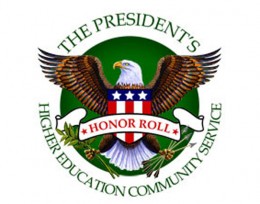
Wright State is listed on the Honor Roll with Distinction for its strong institutional commitment to service.
For the second consecutive year, Wright State University has been named to the President’s Higher Education Community Service Honor Roll for its support of volunteering, service-learning and civic engagement.
Wright State is listed on the Honor Roll with Distinction for its strong institutional commitment to service and campus-community partnerships that produce measurable results for the region. Only 114 institutions across the country received such an honor.
“This recognition is a testament to our commitment to the communities we serve,” said Wright State President David R. Hopkins. “Our students, faculty and staff work tirelessly to contribute to improving the lives of others throughout Raider Country, gaining unique experiences and learning valuable lessons.”
A total of 8,655 Wright State students were involved in academic service-learning during the 2009-10 school year, resulting in 932,638 service hours that touched the lives of 59,696 community members.
“Service-learning and community engagement are building tremendous momentum at Wright State,” said Cathy Sayer, director of service-learning. “Our students are stepping up, not only to serve, but also to take leadership in addressing community needs.”
Examples of service-learning include:
- Members of the Black Men on the Move student organization mentor students at Thurgood Marshall High School in Dayton. Read More
- Students travel to rural Appalachian communities over spring break to assist low-income seniors and people with disabilities with home repair projects. Read More
- Public relations students work to spur economic development in Clinton County communities rocked by unemployment and layoffs. Read More
- Student philanthropists raise funds and award grants to local nonprofits. Read More
- Students, faculty and staff run the Friendship Food Pantry on campus, providing students in need with emergency food and baby care items. Read More
“This fall we began offering several modest scholarships to students willing to engage in 300 hours of community service during the year,” said Sayer. “So we hope to see even greater student leadership of community engagement in the future.”
Service-learning is not limited to student activities.
In the last four years, 42 faculty members have participated in year-long learning communities to develop new service-learning courses. Staff members instituted a “We Serve U” program and have incorporated service projects into their staff development days.
The Corporation for National and Community Service oversees the Honor Roll in collaboration with the U.S. Departments of Education and Housing and Urban Development, Campus Compact and the American Council on Education.
Honorees are chosen based on a series of factors, including the scope and innovation of service projects, the extent to which service-learning is embedded in the curriculum, the school’s commitment to long-term campus-community partnerships and measurable community outcomes as a result of the service.
For more information on the Honor Roll, visit http://www.nationalservice.gov.

 Wright State faculty member Damaris Serrano wins Panamanian literary award
Wright State faculty member Damaris Serrano wins Panamanian literary award  Wright State grad Hannah Beachler earns Oscar nomination for production design on ‘Sinners’
Wright State grad Hannah Beachler earns Oscar nomination for production design on ‘Sinners’  Wright State alum Emily Romigh builds on a family legacy in education
Wright State alum Emily Romigh builds on a family legacy in education  Wright State receives $3 million grant to strengthen civic literacy and engagement across Southwest Ohio
Wright State receives $3 million grant to strengthen civic literacy and engagement across Southwest Ohio  Fitness Center renovation brings new equipment and excitement to Wright State’s Campus Recreation
Fitness Center renovation brings new equipment and excitement to Wright State’s Campus Recreation 